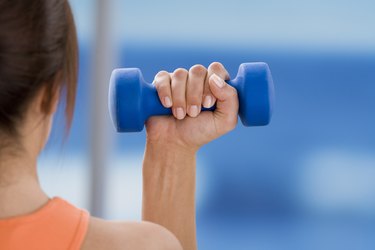
When you construct a building, you need the right materials -- the same is true when you're toning your muscles. While resistance-training exercises are a part of the body plan, your nutritional intake must provide the right material to make new muscle fibers. Protein is one of the chief nutrients your body uses to create and repair muscle fibers. When you are trying to tone up, protein can be vital to your success.
The Science of Protein and Muscles
Video of the Day
Protein is present in skin, bone, hair and muscle tissue. Composed of smaller building blocks called amino acids, protein from your diet is broken down and reconstructed into strong, durable muscle fibers. When you perform resistance-training exercises, the activity creates tiny tears in your muscle fibers. These tears are then repaired from the amino acids found in the proteins you ingest, and you grow stronger as a result. Unlike fats and sugars, your body does not store protein, so you need to take in a steady supply to continue your muscle-toning efforts.
Video of the Day
Muscle Recovery
When you are consuming protein to tone up, timing is important for muscle recovery. For example, exercise physiologist Jim Stoppani, Ph.D., recommends drinking a protein shake before your exercise session because the shake delivers nutrients to your muscles while you exercise. This prevents muscle breakdown, which can contribute to next-day muscle soreness that keeps you from continuing your resistance-training sessions. Drinking a protein shake after your exercise session also helps you prevent muscle breakdown and encourages muscle repair. By enhancing the rate at which your muscles recover through protein supplementation, you may be able to tone up faster and more efficiently.
Daily Protein Intake
How much protein you need to tone muscle depends upon a variety of factors, including your overall physical activity level and your weight. Very active people, particularly those who are strength athletes, require more protein than inactive individuals because their bodies need protein to build muscles. If you are not very active, you will require about 0.36 g of protein per pound of your body weight. However, if you are active, you will need between 0.7 and 0.8 g of protein per pound of body weight, according to Peter Lemon, professor of exercise nutrition at the University of Western Ontario interviewed on "Men's Fitness." 0.82 g of protein per pound of body weight is the upper limit at which protein intake will help tone your body and affect it's composition, according to a study by Phillips and Van Loon in 2011.
Eating for Toning
On a workout day, you can drink about 20 g of protein in the form of a protein shake before your workout and 40 g of protein post-workout. Protein shakes vary in their sources of protein. There many varieties such as whey, soy, wheat, egg albumin, casein, pea protein, milk protein, and more. Incorporate lean protein sources like eggs, chicken, fish and low-fat dairy products. If you eat a 4-oz. serving of fish or chicken, this contains about 28 g of protein, which can help you meet your overall daily protein goals.
- "Muscle and Strength"; Taking a Closer Look at High Protein Foods; Damien Mase
- "Men's Fitness"; Protein: A Guide to Maximum Muscle; Samantha Heller, R.D.; 2011
- "Muscle & Fitness Hers"; Protein Primers; Jim Stoppani, Ph.D.; July 2008
- The Myth of 1g/lb: Optimal Protein Intake for Bodybuilders
- Dietary Protein for Athletes: from requirements to optimum adaptation
- Protein Supplements Guide: Learn How to Choose th Right Product